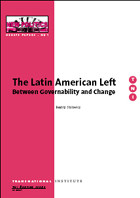Ideas into movement
Boost TNI's work
50 years. Hundreds of social struggles. Countless ideas turned into movement.
Support us as we celebrate our 50th anniversary in 2024.

The Latin American left today is seemingly much stronger than it was half a decade ago, but not yet strong enough for the challenges that lie ahead.

Latin America has entered a new political conjuncture. The electoral force of the left is a relevant indicator of the new political moment, but it is neither sufficient as an expression nor as an explanation for that moment. It could even lead to mistaken conclusions, such as the supposition that the electoral force of the left in itself means an absolute decline of conservative forces in the region.
While such signs of the advance of popular forces justly inspire hope and enthusiasm, this should not obscure the complexity of Latin America's political processes. At this new conjuncture, the electoral rise of the left expresses a new social and political reality, defined fundamentally by the ascent of popular struggles and the endurance of resistance to neo-liberalism.
Sometimes, this new reality is manifest in popular uprisings able to stop privatisations, reverse unpopular policies and bring down presidents. In some cases, such struggles have been the immediate precursors to electoral success. This ample and diverse panorama of struggles does not always correlate with elections, however, and the actors are not necessarily tied to the left parties that participate in electoral processes.
The Latin American left today is seemingly much stronger than it was half a decade ago, but not yet strong enough for the challenges that lie ahead. This could mean reversions. It can be argued that, on the whole, the left's experiences of government across the region show mostly positive results: full of creativity, responsive to the needs of the grassroots,offering greater transparency and subject to the permanent scrutiny of society, forced to give results, and aimed at the gestation of a "governing citizenship".
For many parties, the experiences in government represent the richest aspect of their political practices. Yet these experiences have not always contributed (nor to the same degree)to generating an enduring political force, and they also run the danger of becoming routinised, if splendid, administrations that could exhaust themselves as truly alternative projects
Pages: 20